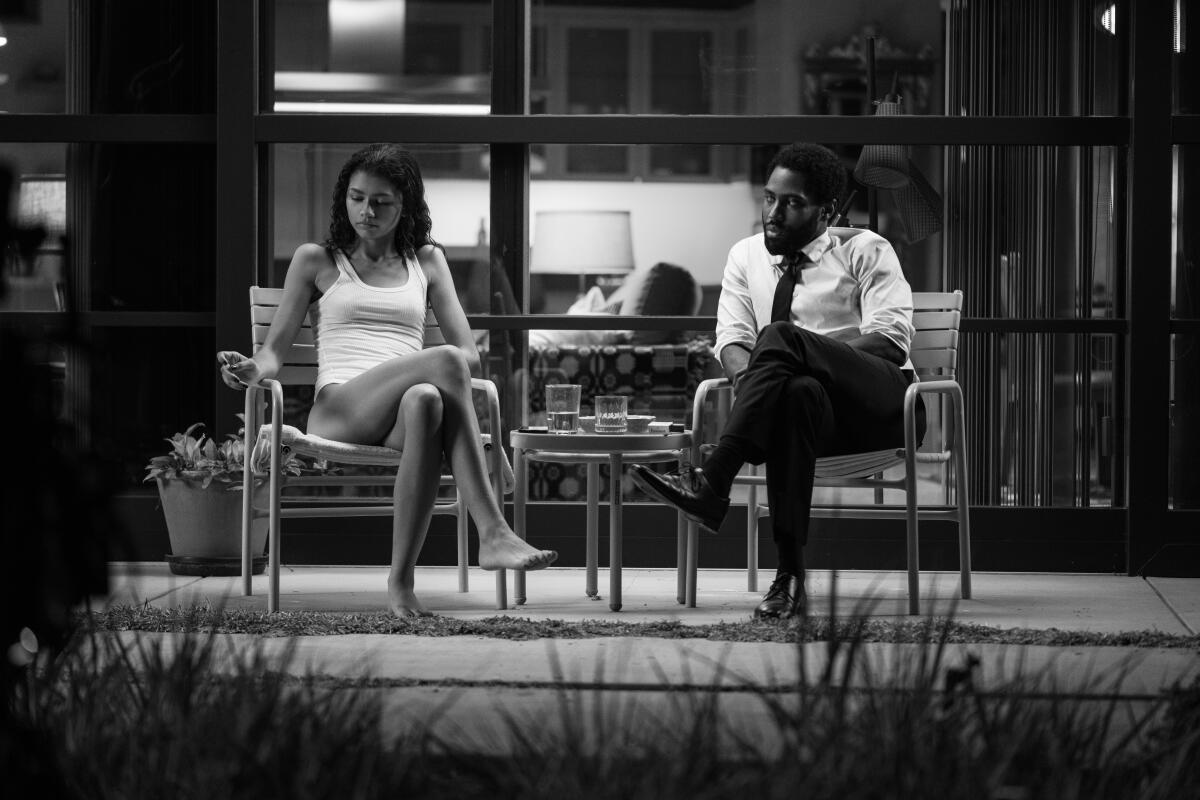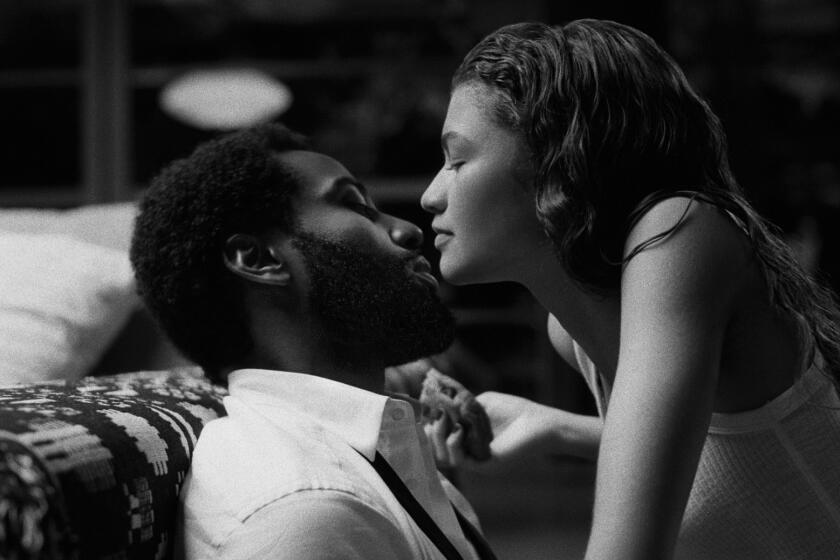Column: ‘Malcolm & Marie’ filmmaker Sam Levinson wanted to start a conversation. Just not this one

Sam Levinson says he wrote and directed “Malcolm & Marie” to spark a larger conversation, and in that he has most certainly succeeded.
That the conversation it sparked leans heavily on what many consider the myriad reasons to hate “Malcolm & Marie” probably is not what Levinson had in mind. But the fact that even the film’s harshest critics were forced to wade directly into its themes of authenticity, artistic intention and personal responsibility proved the validity of some of its points — while also putting to the test the oft-stated desire of filmmakers to act as a cultural catalyst.
Levinson, best known as the creator of the HBO series “Euphoria,” is not unfamiliar with criticism. Nor is he unwilling, as many filmmakers are, to engage with it.
Indeed, at this point, he probably has spent more time responding to criticism of “Malcolm & Marie” than he did writing it; since the film’s Feb. 5 debut on Netflix, he has participated in a slew of conversations about it, including one with star Zendaya and another, recently, with me.
This may not be a good sign for the film — if you have to repeatedly explain what you were trying to achieve, perhaps you did not quite achieve it — but it is a good sign for the culture.
At this moment in time, it is difficult not to rejoice over the mere existence of an impassioned debate about any film. After a year of conversations dominated by a deadly pandemic, international protests against racist police brutality, a fraught presidential election (followed by an armed insurrection and impeachment), not to mention a perilous shutdown of so many cultural arenas — including movie theaters and moviemaking — the fact that anyone can find the bandwidth to be outraged by a film is cause for celebration.
For those who have not seen it, “Malcolm & Marie” is the story of an argument. Filmmaker Malcolm (John David Washington) and actress Marie (Zendaya) return home from the premiere of Malcolm’s latest work only to become embroiled in one of those exhausting and exhaustive quarrels couples occasionally have.
Having neglected to publicly thank Marie for her contributions, Malcolm prods her into discussing the slight, only to dismiss any hurt she may have felt. Having warned him that nothing good can come of talking about the issue that night, Marie finally gives way, setting off a nearly two-hour dialogue in which she expresses, among many other things, her anger over her belief that Malcolm based his film on her life experience as a recovering addict — and then refused to cast her as the lead because he did not want to share the creative limelight.
Malcolm, high off a night of success, deflects and denies — with no small amount of personal abuse as well as many angry discourses on the nature of inspiration, film, ambition, film criticism and the obstacles faced by Black filmmakers. Marie, meanwhile, repeatedly tries to puncture his philosophical rants with the insistence that Malcolm take some personal responsibility for a change.
When “Promising Young Woman’s” Carey Mulligan objected to a review of her performance, film Twitter exploded. Why critics should welcome the scrutiny.
It is an intentionally insular film, attempting to capture the ruthless combination of insight and blindness found in many intimate relationships while making a lot of wild-eyed, occasionally pointed and often absurd comments about filmmaking. In its own way, it is disturbingly emblematic of 2020, during which many people, deprived of outside contact, grappled with important issues from the confines of their own heads.
And there are few situations more perilous than being trapped inside one’s own head.
“Malcolm & Marie” is certainly a product of the pandemic. Levinson and Zendaya were working on the second season of “Euphoria” when the coronavirus shut down production. Zendaya asked Levinson to write a movie that they could make while following social-distancing restrictions. “We wanted to get a group of people back together, working again,” Levinson says. Making it a “two-hander” was a way to reduce risk, as was shooting it all in one house. The decision to not fully “dress” the house, Levinson says, led to the decision to shoot in black-and-white “so the set wouldn’t look so bare.”
He wrote the film in about a week, against the backdrop of the summer’s Black Lives Matter protests and with a lot of input from a relatively small number of people, including his two stars and his wife, Ashley Levinson, who is a producer on the film. He grounded his characters in filmmaking, he says, because he wanted the conversation to be about more than a couple’s relationship. “I was working with two characters, one house — how do we tell a story that is emotionally engaging and can spark a conversation that reverberates beyond the movie? How can we dig these characters into a hole that they then are trying to dig their way out of?”
It’s a question many believe could be aimed at Levinson. The reaction to “Malcolm & Marie” has been as intense and wide-ranging as the argument it chronicles, including but not limited to criticism of: the age difference between its leads (12 years); all the manic film philosophizing; the decision to film in black-and-white; the minimal furnishing of the house; perceived similarities to “Who’s Afraid of Virginia Woolf?” and, most universally, the fact that Levinson, who is white, appeared to be using the character of Malcolm, who is Black, to vent his personal frustrations as a filmmaker.
Especially during a sustained takedown of a particular critic who panned his last film and whom he identifies as “the white lady from the L.A. Times.”
Now, making a film about filmmaking is always a risk — Hollywood and those who cover it tend to disproportionately love them or hate them; there is hardly ever any middle ground.
Calling out a specific film critic, particularly by the term “white lady,” is absolutely guaranteed to get the attention of everyone who writes about film. Critics are, or should be, fair game and there have been many negative portrayals of critics in film. But these characters are rarely working film critics who are easily identifiable and who have in fact reviewed the actual filmmaker.
As Katie Walsh is currently one of only two white women who write film criticism, on a freelance basis, for The Times, and as it was she who wrote a very negative review of Levinson’s last film, “Assassination Nation,” it wasn’t a leap for many to posit that Malcolm is an avatar for Levinson. Add to that the abusive language Malcolm uses to describe the female critic — the kind of language with which female critics are far too familiar — and it should surprise no one that this relatively small portion of the film immediately became its most talked-about on social media.
Review: ‘Assassination Nation’ is exploitative horror that has the gall to lecture us on grrrl power
The one good thing to say about the slasher pop satire “Assassination Nation,” a badly bungled attempt at social commentary from writer/director Sam Levinson, is that it’s certainly got spirit.
It did, apparently, surprise Levinson. He acknowledges that he was not thinking about the particularly vituperative and misogynistic abuse female critics can face when he wrote those bits of Malcolm’s monologues, and he says he was not singling out Walsh. “Look, as much as I am loath to admit it, she was not the only person who hated ‘Assassination Nation,’” he says. Within the film’s narrative, he notes, Malcolm’s debut takes place at an L.A.-based film festival, so citing the local newspaper made the most sense and (as he has pointed out in other interviews) should not be construed as Levinson criticizing his critics. Marie, a character he also wrote, belittles Malcolm for complaining about this fictional critic and winds up taking her side.
Levinson didn’t realize how personal it might feel, for Walsh or other female critics, he says, because he was concentrating on creating the character of Malcolm — a man who clearly has issues with women — and how he would react.
Since the film’s release, Levinson has “gotten so many notes from other filmmakers about how Malcolm’s rants are so painfully familiar and cringe-worthy,” he says. “That’s part of the design of the film, its absurdity and cruelty: What happens when a fight goes too far? I think that it’s triggering for white women, it’s triggering for Black creatives, it’s triggering on a lot of ends. ... How do we feel boxed in based on our identity?”
And Malcolm, he says repeatedly, is a character; indeed, the only thing that causes Levinson to bristle during an almost two-hour conversation is the notion that he put his own words in the mouth of a Black character.
“I wrote a Black character,” he says. “He is a filmmaker. You want to say a Black filmmaker working in Hollywood is not going to have an issue with some of the things going on — with critics, producers, executives? He’s going to have some grievances and he should have the freedom to make fun of the things he wants to.”
What he doesn’t understand is why some seem to believe the film is endorsing Malcolm’s viewpoint at the expense of Marie’s, since he considers her the emotional linchpin and conscience of the movie.
“There are two ways to look at the story,” Levinson says. “It’s either a celebration of the artist’s ego or an evisceration of the artist’s ego.
“What happens over the course of the movie is that Malcolm stakes a million and one positions and then he’s rendered completely speechless as Marie breaks down what she sees as his issues as an artist and a human being — she says at one point that ‘[the critic’s] issue with you is the issue I have with you as a human being.’
“So I was surprised,” Levinson continues, “when a bit of the response has mirrored the ego of Malcolm, negating everything Marie has to say.”
John David Washington and Zendaya star in Sam Levinson’s self-defeating two-hander about a relationship on the rocks.
He also says, as most artists do, that he has no problem being reviewed negatively. “I don’t think anyone would accuse me of seeking consensus. I actually think consensus is the enemy.” It is harder when negative reviews come during a film festival, he says, “when all the buyers are waiting for and weighing the advanced reactions,” but “one of the themes of this film, which Marie says to Malcolm, is that if you’re unable to take criticism, if you’re unable to listen, you’re unable to grow. That if you steamroll everyone, which he does for 80% of the movie, you will create a fictional reality — and that is the death of an artist.”
Still, he believes that while critics often question how a filmmaker’s identity informs a movie, they rarely engage in similar self-reflection. “Malcolm’s core issue is that his identity is at issue, but the [critic’s] identity goes into it as well.”
It is an odd experience to have a lengthy conversation with a filmmaker about the intense criticism he has received about his latest film. He is describing the film he believes he made, often in point-by-point opposition to how that film was received by many, and the gap between intention and perception seems, at times, absurdly wide. But there is no way to breach it; the relationship between perception and reality is not categorical or even definable, which is one of the messages of the film. No two people experience any work of art in exactly the same way, which is one reason criticism exists.
I experienced “Malcolm & Marie” as an imperfect film that was, by turns, satiric, insightful, disturbing and infuriating in a very “the cine-bros are talking again” kind of way. And those feelings about the film absolutely color my interpretation of my conversation with Levinson..
It is inarguable that white creators and critics do not question often enough how their identity shapes their perception; all of us have been raised in a society in which the default perspective is “white” and it is impossible to overstate how deeply that influences our actions, reactions and attitudes. But whiteness is not monolithic. Among many other things, my being a woman shapes my perception, just as Levinson being a man shapes his. When I was a critic, I was often criticized for short-sightedness or bad writing, occasionally to my face by creators, which is part of the job. But I also was often abused simply for being a woman, for perceiving things as a woman, for being psychologically incapable of comprehending a male viewpoint.
Levinson is being called out for writing a Black man and a Black woman, for creating a power dynamic between two characters some believe he is psychologically incapable of understanding. Are these charges valid? Does creation need to be continually contextualized? Does criticism?
At a certain point in our conversation, Levinson says the film is “an ongoing dialogue between two characters who say things that are true, that are untrue, who stake positions that they contradict.” And what has surprised him about the response is that “it mirrors our inability to listen to one another and to take it all in as opposing viewpoints.”
He sees that as a reflection of our culture. But casting disagreement as the inability to hear or tolerate opposing viewpoints is also prevalent in this culture, in part because there is an increasing attempt to blur the line between facts and viewpoints (“Racism is real” is not a viewpoint) and in part because we have become reliant on forms of communication that defy authentic debate. But people can still honestly disagree about many things.
Levinson may believe that some critics read the movie wrong, or were sidetracked by their outrage over the “white lady” comments. He certainly believes that too many are disregarding the importance of Marie as a character. But is that what happened? Or did he wind up making a movie that was different from the one he thought he made?
Maybe, maybe not. He says he wanted to provoke conversation rather than consensus, and conversations about more universally acclaimed works generally begin and end with the unhelpful notion that “we should make more movies like this one.” Sometimes it is the flawed films or, for that matter, the flawed pieces of criticism that provoke the most meaningful conversations. And once started, those conversations often take on a life of their own.
That’s what makes them meaningful.
More to Read
Only good movies
Get the Indie Focus newsletter, Mark Olsen's weekly guide to the world of cinema.
You may occasionally receive promotional content from the Los Angeles Times.









